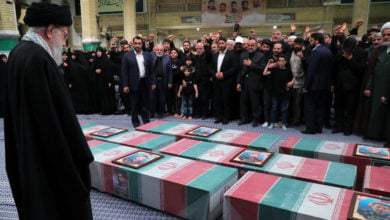Egyptian filmmaker and producer, Youssef Chahine, died on July 27. He was 82 years old.
|
One of his earliest films “Siraa Fil-Wadi” (“Struggle in the Valley,” 1953), stars a young and unknown actor Michel Chalhoub, later known internationally as Omar Sharif. The film was shot while Farouq was still King and dealt with the injustice of feudalism in Egypt and the resulting abject enslavement of farming peasants, a subject Chahine would return to in his 1969 film “Al-Ard” (“The Land,” 1969).
Chahine was credited with creating a sense of realism that dealt with his characters’ internal and psychological turmoil. His film “Bab el-Hadid” (“Central Station,” 1958) shocked Arab audiences in Egypt and the rest of the Arab world with his disturbing portrayal of sexual frustration, the poor and downtrodden and violent murder. He played the film’s central character, Qenawi, a newspaper seller incapable of speech and living in a hut at the central train station. Egyptian film critic and scholar Duriya Sharaf el-Din called it “one of his most important films.”
“Al Nasser Salah el-Din” (“Saladin,” 1963) was considered a major film production in Egypt. The three-hour epic shot in Cinemascope was co-written by Naguib Mahfouz and Abd el-Rahman Sharqawi. The film was a symbolic portrayal of Egyptian President Gamal Abdel Nasser as the Arab leader who would unite the Arab world and force western imperialist powers and Zionism out of the region.
The 1967 Six-Day War that resulted the Israeli defeat of Egypt, Syria, Jordan and the Arab forces was a “severe psychological blow” to all and created the “new cinema” group. Egyptian critic and journalist Raouf Tewfiq credits the post-1967 period in Egyptian film as an “attempt at self-expression and the concerns of young people and Egyptian society after the defeat.”
The release of “Al-Asfour” (“The Sparrow,” 1972) expressed the sorrow, grief, frustration and the refusal to accept literal and psychological defeat by the people. Chahine once again invoked symbolism and the internal struggle of his characters in the film to analyze the reasons for the defeat and pointed the finger at corruption and also noted the people’s will to overcome and fight on.
His film “Al-Massir” (“Destiny,” 1997) was an attempt to deal with growing Islamic conservatism and its reactionary affect on art and self-expression in Egyptian society. His last film project was entitled “Heya Fawda?” (“Is It Chaos?”, 2007) and once again was a criticism of autocratic rule and life under a police state as is contemporary Egypt.
Chahine was invited to “Comedie-Fran?aise” in Paris, France, in 1992 to direct a theatrical stage play of his choice. He adapted and directed “Caligula” by Albert Camus, which met great success. Chahine was awarded a lifetime achievement award at the Cannes Film Festival in 1997.
Chahine’s films greatly advanced the growth of Arab cinema and contributed to a better understanding of the Arab world, culture and people in the United States, where anti-Arab racism continues to be perpetuated by Hollywood and the corporate media.







